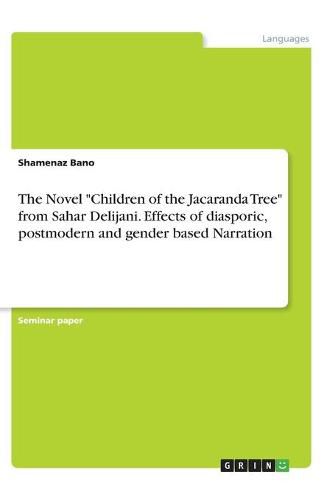Readings Newsletter
Become a Readings Member to make your shopping experience even easier.
Sign in or sign up for free!
You’re not far away from qualifying for FREE standard shipping within Australia
You’ve qualified for FREE standard shipping within Australia
The cart is loading…






Seminar paper from the year 2020 in the subject Literature - Middle East, language: English, abstract: The paper analyzises the effects of diasporic, postmodern and gender based voice in the novel "Children of the Jacaranda Tree" from Sahar Delijani. Sahar Delijani an Iranian author whose debut novel, Children of the Jacaranda Tree, is a novel which reflects a female writer's voice out of her country which symbolically presents a diasporic, gender based voice. This voice has been raised out of her homeland (abroad, in USA and Italy) and tries to reflect her voice in her second language with a globalized view based on her natural feminist and cultural background. Her novel is a political protest but here we just want to analyze the effect of its diasporic, postmodern and gender based narration of globalized world of literature. In spite of a rich trove of classical works (mainly poems), modern Iranian literature is less than a hundred years old. If we consider the works of Sadegh Hedayat (1903-1951) in fiction and Nima Yushij (1895-1960) in poetry as the beginning of Iran's modern literature, then we can discern two influential factors in its development. First, there is a certain level of familiarity and interaction with the latest intellectual trends and literary achievements of the West. Second, a political openness at home, which brings about a suitable atmosphere for exchange of ideas and publication of new voices.
$9.00 standard shipping within Australia
FREE standard shipping within Australia for orders over $100.00
Express & International shipping calculated at checkout
Seminar paper from the year 2020 in the subject Literature - Middle East, language: English, abstract: The paper analyzises the effects of diasporic, postmodern and gender based voice in the novel "Children of the Jacaranda Tree" from Sahar Delijani. Sahar Delijani an Iranian author whose debut novel, Children of the Jacaranda Tree, is a novel which reflects a female writer's voice out of her country which symbolically presents a diasporic, gender based voice. This voice has been raised out of her homeland (abroad, in USA and Italy) and tries to reflect her voice in her second language with a globalized view based on her natural feminist and cultural background. Her novel is a political protest but here we just want to analyze the effect of its diasporic, postmodern and gender based narration of globalized world of literature. In spite of a rich trove of classical works (mainly poems), modern Iranian literature is less than a hundred years old. If we consider the works of Sadegh Hedayat (1903-1951) in fiction and Nima Yushij (1895-1960) in poetry as the beginning of Iran's modern literature, then we can discern two influential factors in its development. First, there is a certain level of familiarity and interaction with the latest intellectual trends and literary achievements of the West. Second, a political openness at home, which brings about a suitable atmosphere for exchange of ideas and publication of new voices.